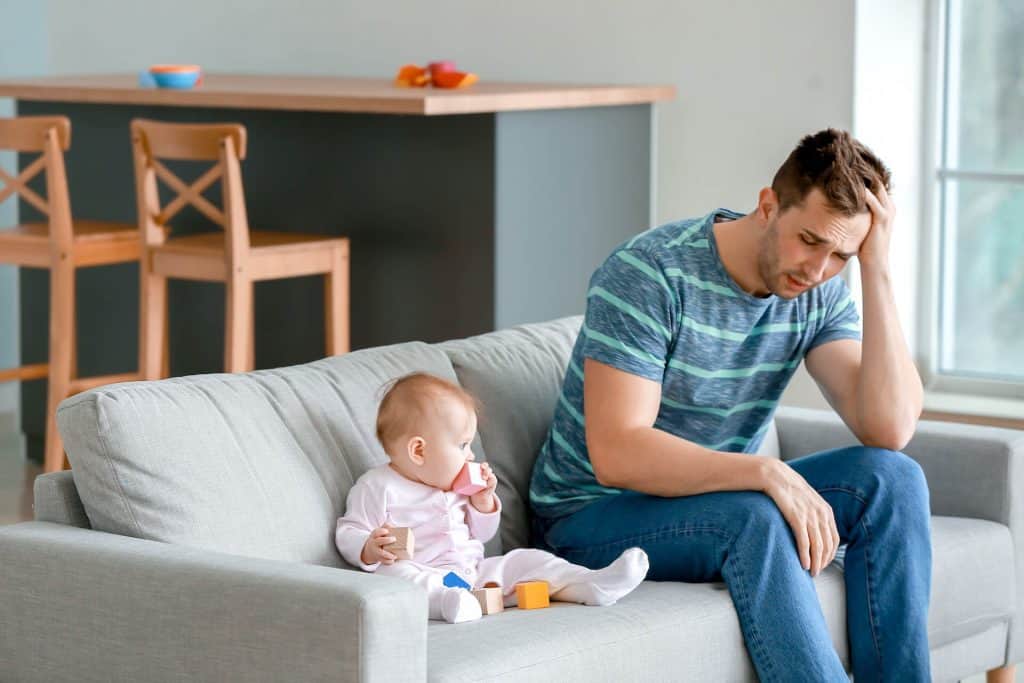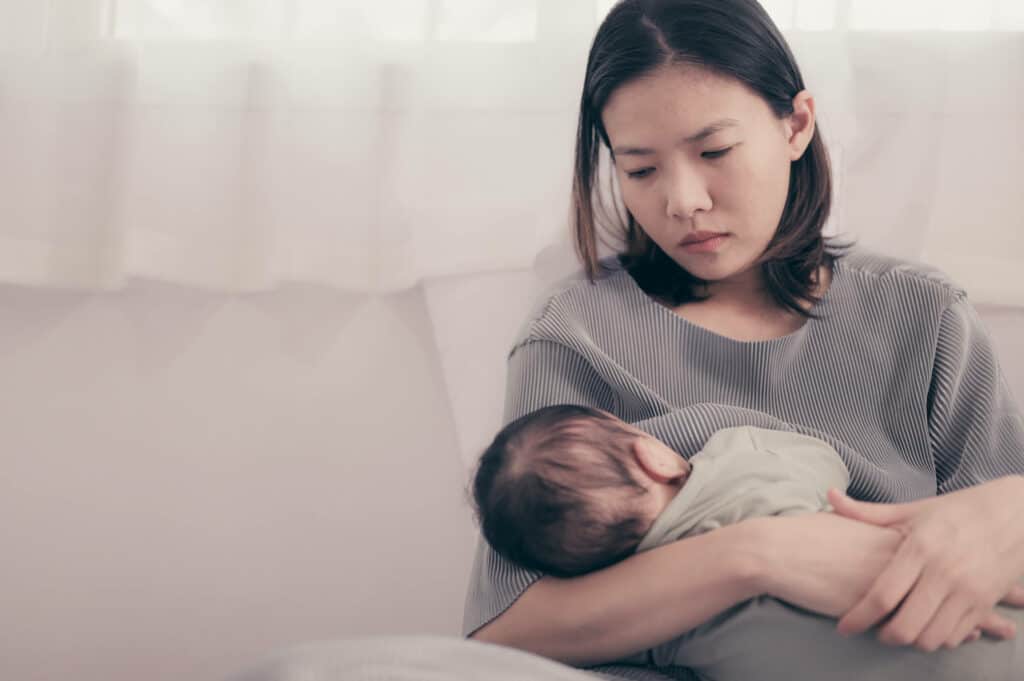Becoming a parent should be a joyful experience. But for many it can be far from that. It can be a time of fear, anxiety, depression and overwhelming feelings. And not only for women. It can also affect men.
With a theme of ‘Tell someone who cares’, Perinatal Anxiety and Depression Awareness Action (PANDA) Week runs from November 8 to 14. In its 15th year, PANDA raises awareness about perinatal mental health.
Did you know that 1 in 5 expectant parents and 1 in 10 non expectant parents experience perinatal anxiety and depression after the baby is born? But most people do not realise it can affect men. With their partner pregnant, men’s lives are changing too. They have more responsibilities and relationships can change during pregnancy and once your child arrives.
PANDA is more important than ever with expectant parents struggling through COVID-19. It is a time to support parents facing any challenges at such an important time in their lives. They may not realise or know how to reach out for support. Raising awareness about perinatal anxiety and depression helps dispel the stigma surrounding mental health and parenting. It allows people to open up about how they are feeling.

What is perinatal anxiety and depression?
Perinatal anxiety and depression affects about 100,000 Australian families every year. It can be devasting for the whole family if left untreated.
Becoming a new parent is exciting but has its challenges. And it takes time to adjust to a new baby in the home. Feeling anxious, irritable or teary for a few days after the birth of your child is normal. It is when anxiety and feeling low prevents you from functioning as a parent for two or more weeks that you may be experiencing perinatal anxiety or depression. If you feel this way, book in to see your doctor.
Signs of perinatal anxiety and depression
It can be difficult to recognise perinatal anxiety and depression. Sometimes symptoms get brushed aside as being a normal part of pregnancy or learning to cope with parenthood. And many new parents may hide the symptoms because they feel ashamed or fear the stigma mental health challenges can carry with them.
Everyone experiences perinatal anxiety and depression differently. Common signs include:
- Losing interest in the things you usually enjoy.
- Constantly feeling down and crying for no apparent reason.
- Always tired with a lack of energy.
- Changes to sleep patterns such as trouble sleeping or sleeping too much.
- Persistent worrying about the baby for no apparent reason.
- Trouble focusing and remembering things.
- Panic attacks and feeling detached from your environment.
- Unusual risk taking behaviour such as drinking or taking drugs.
- Feeling nervous and on edge.
- Mood swings and irritability.
- Withdrawing from family and friends.
- Thoughts of suicide, death or self-harm.
Any symptoms that persist for two or more weeks is a sign you need to seek support. The sooner you get help, the sooner you can adapt and feel better about everything.

Tips to help you
Too many new parents struggle through perinatal anxiety and depression alone. There is no need to. There is help available. And there are things you can do to help yourself.
Here are some tips to help you cope with being a new parent.
Take time out to rest
Taking time out to rest is easier said than done. It can seem impossible to get a break with a new baby in the house and everything else on your agenda. The unpredictability of your child’s demands for food can have you up all hours of the night and day. When baby is asleep, there are household chores to catch up on. Then there are the times where your baby just will not settle. Not to mention the time it takes to care for and love your child. It can all become overwhelming and exhausting.
You cannot do it all. Instead of getting stuff done when your child sleeps, take a nap yourself. Or, at least, take some time out to relax. Sleep is important as a lack of it affects how you feel. The household chores can wait while you catch up on some sleep or rest and relaxation.
Accept the housework may not get done some days. And that is okay. If it worries you so much, ask a friend or family member for help.
Self-care is vital
Self-care is vital during your pregnancy and as a new parent. You can put all the plans in the world in place, but so much can be out of your control. And it is difficult to look after a new baby if you do not look after yourself. Get some rest, eat a healthy diet, exercise regularly and try practicing mindfulness.
For good psychological wellbeing, you need balance in your life. You need rewarding experiences to balance the challenges. To get more balance, you can:
- Do something just for fun, for the pure pleasure and joy you get out of it.
- Spend time with people who make you feel positive — about yourself and the world around you.
- Take the time to do things that give you a sense of achievement and satisfaction.
- When feeling overwhelmed, slowly breathing count backwards from 20. Each count is one breath.
It does not matter what you do as long as it is rewarding and leaves you feeling good.

Have realistic expectations
It is all too easy to have unrealistic expectations of parenthood. Everywhere you turn you are constantly bombarded with images of the ideal. It is important to have realistic expectations of the birth, and how you and your family will embrace a new baby. Be realistic about the type of mother you will be. Do not expect to be perfect. It can be a roller coaster of emotions and a time of many changes. There is so much to learn. So do not be hard on yourself. It takes time for you and your household to adapt.
Try not to plan out each day in advance. Instead go with the flow. Allow how you feel in the moment tell you what you and your baby needs. A new baby to look after is not easy. Forget any ideals of striving for perfection. Being a good parent is what your child needs.
Share how you feel
Too often people mask how they feel or withdraw from family and friends. This is a common sign of perinatal anxiety and depression. It can make how you feel worse. But to get the support you need, talk with the people you trust or to your health professionals.
Share how you feel and your experiences with playgroups, mothers and support groups. This can show that your feelings are not uncommon. You are not alone.
While it may look like everyone around you is coping, it is likely someone in one of your groups is struggling with something similar. Speak up. Do not be afraid to share how you feel. You may even inspire someone else to share their feelings. You can:
- Connect with Facebook groups.
- Take your child to story time at the local library.
- Join a group for first-time parents.
- Join a local playgroup.

Seek support early
You know yourself better than anyone else. If throughout your pregnancy and after your child’s birth you cannot shake off feelings of sadness or are struggling in some way, seek support. You do not have to feel this way. Try talking to someone close to you. Someone you trust. A family member, friend, partner or a health professional.
Be honest with your health professionals when they ask how you feel. Tell them how you feel when you are struggling with pregnancy or with your new baby. There is no need to feel ashamed. It shows you want the best for your family. No one is going to judge you when you confide in them. Many people go through the same thing.
With this year’s PANDA theme ‘Tell someone who cares’, the spotlight is on recognising you are struggling and reaching out for support.
We are here to help
Many new parents go through perinatal anxiety and depression so you are not alone. There is help available. The sooner you get help, the sooner things will improve. This should be a time of joy but the changes to your life can be overwhelming. And you may feel alone and think no one understands how you feel. Or you may be scared to admit how you feel for fear of what others will think or say. But it is important to make an effort to reach out.
If you are struggling, consider reaching out to our professionals. When you are not coping, contact us to discover how we aim to help get your life back on track. But if you reach a crisis point, call us immediately. We are here to help support you. We may help you deal with things quickly.
We can work with you over the phone, via Skype or in our Spas. Book in today for my Emotional Empowerment Program. I have an introductory offer for just $79 so you may start taking back control of your life. We aim to help you cope with any mental health challenges. Our facilitators may alleviate the effects of perinatal anxiety and depression so you look forward to enjoying parenthood.
Let me help alleviate the effects of mental health issues
My Emotional Empowerment Program has helped many people like you for more than a decade. We may help you deal with perinatal anxiety and depression as a new parent. My aim is to help you replace anxiety and depression with a new hope for the future. A future filled with happiness and contentment in weeks not years. Listen to what Ruth has to say about my program after only a few sessions.
Give the Blissiree ™ a try by booking a free 25-minute telehealth consultation. Or discover a seamless way to rejuvenate your emotional and mental health by becoming a member. It will give you access to more than 75 audio programs that can help your child and you to live inspired and improve mental wellbeing.


